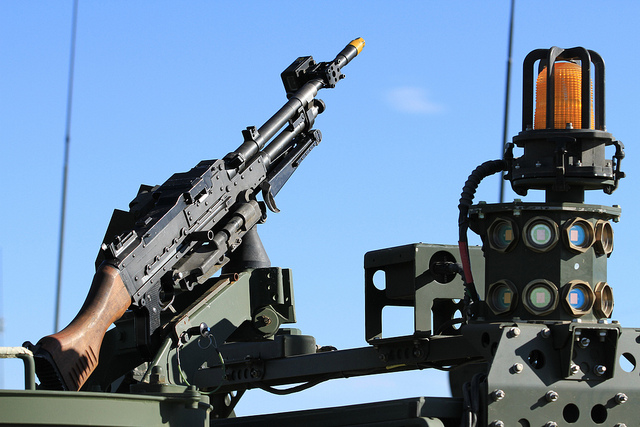Both Swedish and Canadian foreign policy approaches were recently criticized for their stance on selling arms to Saudi Arabia, with the Canadian government defending its decision to supply Light Armored Vehicles (LAVs) to a country with one of the worst human rights records in the world, at the same time as Sweden decided to cancel its arms deal with the gulf state.
Prime Minister Stephen Harper describes Canada’s foreign policy as ‘principled‘, though he is less clear about what these principles are. In contrast, Sweden — a country often compared to Canada as reflecting similar social and political values — defines its foreign policy as explicitly feminist.
In 2014, the Canadian government signed its largest ever arms export deal, worth $14.8 billion, to supply LAVs to Saudi Arabia. Canada has supplied LAVs to Saudi Arabia since 1993, with exports increasing over the last few years.
The Canadian government says the new deal will generate 3,000 advanced manufacturing jobs for 14 years, as well as thousands of other jobs for suppliers. Saudi Arabia is currently Canada’s second largest export market in the Middle East, and will now be the largest recipient of crown-corporation brokered military export contracts, surpassing the U.S. for the first time.
However, Canada has laws (if not principles) regarding to whom it can export weapons. Under the Canadian Export and Import Permits Act the government can only provide export permits for arms to “governments have a persistent record of serious violations of the human rights of their citizens, unless it can be demonstrated that there is no reasonable risk that the goods might be used against the civilian population.”
Nicholas Marsh, who researches arms transfers at the Peace Research Institute of Oslo notes the Saudi government has little creditability in terms of human rights commitments: “I don’t think that assurances [from the Saudi Government] have much weight.” It is likely Saudi Arabia used Canadian made LAVs to squash peaceful demonstrations for democratic reform in Bahrain in 2011.
Citing Saudi Arabia’s dismal human rights record, NDP Foreign Affairs Critic Paul Dewar called on the Harper government to release its deliberations regarding the recent deal. In response, François Lasalle, spokesperson for the Department of Foreign Affairs and International Trade, stated, “For reasons of commercial confidentiality, the Department of Foreign Affairs, Trade and Development [DFATD] does not comment on specific applications.”
DFATD has refused to provide any further details, including how many vehicles will be supplied, what type of arms the vehicles include and what, if any, assurances it has from the Saudi’s that they will not be used against civilians. The government has prioritized corporate, but not human, rights.
In contrast Sweden has prioritized women’s rights and political freedoms. Swedish Foreign Minister, Margot Wallström, announced last month that Sweden would not renew an arms deal with Saudi Arabia that is set to expire in May. She denounced the Saudi authorities for their disregard for women’s rights, and for the sentencing Saudi blogger, Raif Badawi (whose wife and family live in Canada) to 10 years in prison, 1,000 lashes and a fine of $266,000 for criticizing Saudi clerics.
She said the decision to terminate the arms agreement was inline with Sweden’s feminist foreign policy, which she introduced after taking office in October 2014.
Sweden’s stance comes at a cost. Former Swedish Foreign Minister Carl Bildt argues Wallström’s decision will negatively affect Swedish interest in the Middle East, likely referring to the $550 million Sweden made between 2011 and 2014 from previous arms deals. A group of more than 30 corporations, including Volvo and H&M, condemned the decision in an open letter arguing Sweden’s credibility as a trading partner rested on extending the deal. Saudi Arabia temporarily withdrew its Ambassador from Sweden.
Marsh argues that while the Swedish decision was unique, its principles could be replicated, “The Swedish decision followed a particular process that probably wouldn’t be copied. But I think that States should implement their commitments regarding respect for human rights. If that means antagonizing Saudi Arabia and risking arms contracts then human rights should not be over ridden by financial or economic interests.”
After all, while Canada is gaining a contract it’s trading away its principles, apparently the pillar of the government’s foreign policy.
One of Canada’s stated foreign policy priorities is to “promote democracy and respect for human rights.” Yet in Saudi Arabia, Canada’s second largest trading partner in the Middle East, it is illegal to form or belong to a political party; in 2014, the state carried out 83 beheadings; every year thousands of people are subjected to arbitrary arrest and torture.
A further Canadian foreign policy priority is to promote religious freedoms. In Saudi Arabia, a country described as having “common interests on many peace and security issues” with Canada, public worship by adherents of religions other than Islam is banned.
Harper has personally championed campaigns for maternal and child health, as well as to end early and forced marriage. Concurrently his government “is seeking to diversify its relations with Saudi Arabia,” a country where women are not allowed to attend a doctors appointment without a male relative, fathers can legally chose their daughters’ husbands, and the Grand Mufti has blocked efforts to create laws to protect girls from early marriage.
Canada’s ‘principled’ foreign policy is one of empty rhetoric for profit, while Sweden’s feminist approach is challenging assumptions that economic gains trump all.
Julia is a Postdoctoral Fellow at Simon Fraser University in Vancouver, where she lectures on Canadian Foreign Policy. She holds a PhD in Peace Studies, from the University of Bradford in the UK, and has worked in Europe and Africa on issues related to human rights, development and global health. @juliaheather
Photo: flickr/4 Cdn Div/4 Div CA – JTFC/FOIC



